States are rolling back more and more coronavirus restrictions as vaccines become available and positive cases trend downward nationwide.
Republican Texas Gov. Greg Abbott is expected to make an announcement on removing all statewide orders “soon,” though no changes have been made yet.
CORONAVIRUS IN THE US: STATE-BY-STATE BREAKDOWN
“We’re working right now on evaluating when we’re gonna be able to remove all statewide orders, and we will be making announcements about that pretty soon,” Abbott, who has had a statewide mask mandate in place since July, told reporters during a news conference in Corpus Christi on Thursday without giving a specific date.

People sit at the bar of a restaurant in Austin, Texas, June 26, 2020. (Photo by Sergio FLORES / AFP)
Abbott has issued several executive orders, in addition to the mask mandate, that restricts some business operations if businesses are based in areas with high hospitalization rates.
Positive COVID-19 cases spiked in the state in January and have been on a steady decline ever since. About 7.4 million vaccines have been distributed in the state while 3.5 million first doses and 1.7 million second doses have been administered, according to the Houston Chronicle.
Arkansas has lifted almost all of its restrictions, and a number of other states have already reopened completely, including Iowa, Missouri (with county-wide exceptions) and Flordia.
Republican Arkansas Gov. Asa Hutchinson on Friday lifted most of the safety restrictions it placed on businesses to curb the spread of coronavirus and said he’ll end a mask mandate next month if the state’s test positivity or hospitalizations are low.
Hutchinson announced the rollback of the safety rules as he extended the public health emergency he declared last year because of the coronavirus pandemic until the end of March. The governor announced the move as he’s faced pushback from some fellow Republicans in the Legislature over the state’s virus safety rules.
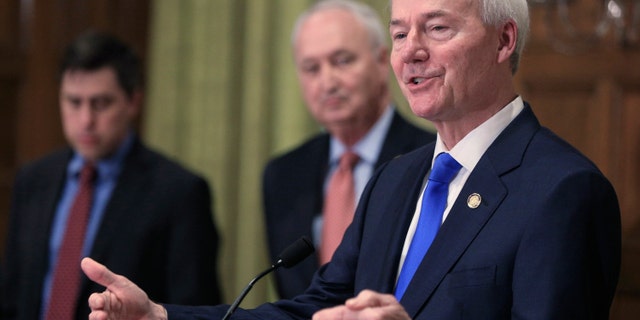
Gov. Asa Hutchinson, right, speaks in Little Rock, Ark. Hutchinson. (Staton Breidenthal/The Arkansas Democrat-Gazette via AP, File)
The limits being lifted include capacity limits for bars, restaurants, gyms and large venues. Hutchinson left open the possibility of reinstating the restrictions if there’s another surge in cases.
Hutchinson said the mask mandate will be lifted at the end of March if the state’s positivity rate is below 10%, with at least 7,500 specimens tested on an average daily basis. If the state tests fewer specimens, the mandate would end if hospitalizations are below 750 patients.
26,000 PEOPLE APPLIED TO MOVE TO ARKANSAS AND GET $10G
Arkansas has recently seen a drop in new cases and hospitalizations. Arkansas as of Thursday had a test positivity rate of about 10%. The state on Thursday reported 522 patients hospitalized because of COVID-19.
Republican Iowa Gov. Kim Reynolds on Feb. 5 lifted all coronavirus restrictions — including a mask mandate — in the state that had been in place since before Thanksgiving, according to an emergency proclamation.
Reynolds lifted all mandates related to masks, indoor and outdoor gatherings, and other business-related restrictions while recommending that high-risk individuals and companies still take necessary precautions to stay safe.
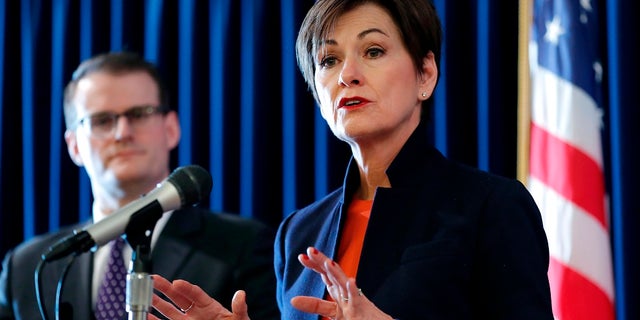
Iowa Gov. Kim Reynolds has not said whether or not she plans to sign the bill into law. (Associated Press)
“I strongly encourage that all businesses or other employers remaining open with in-person operations take reasonable measures under the circumstances of each establishment to ensure the health of employees, patrons and members of the public, including social distancing practices, increased hygiene practices and other public health measures to reduce the risk of transmission of COVID-19,” the proclamation states.
HOUSE OKS $1.9 TRILLION CORONAVIRUS BILL — WITH 2 DEMS VOTING AGAINST IT
Positive COVID-19 cases in the state spiked in November after Thanksgiving and have been declining since then, according to the Iowa Department of Health. More than 680,000 vaccine doses have been administered in Iowa.
In Missouri, Republican Gov. Mike Parson lifted all restrictions in June, including a mask mandate, while keeping a state emergency order in place, allowing counties to determine the best restrictions for their respective areas.
“It is truly incredible to think about how far Missouri has come since March. At that time, no one knew what to expect. There was a lot of uncertainty, worry, and concern,” Parson said in a June 11 statement. “Here we are today, just over 90 days since our first COVID-19 case in Missouri, and I am proud to say we have overcome all of these challenges and more than met our four pillars to reopen.”
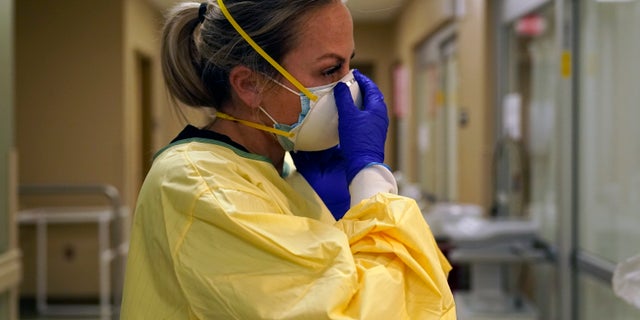
Registered nurse Chrissie Burkhiser puts on personal protective equipment as she prepares to treat a COVID-19 patient in the in the emergency room at Scotland County Hospital in Memphis, Mo. (AP Photo/Jeff Roberson, File)
Those four pillars included expanded testing capacity and volume; expanded personal protective equipment (PPE) reserves through opened supply chains; continued monitoring of hospital capacity; and improved ability to predict potential outbreaks.
Missouri has also seen a progressive decline in cases since November, after Thanksgiving, and declines in cumulative case-fatality rates since June. The state has recorded fewer than 1,000 cases per day over the past two weeks, Fox 2 St. Louis reported on Thursday.
CLICK HERE FOR COMPLETE CORONAVIRUS COVERAGE
More than 1.2 million COVID-19 vaccines have been administered in total, including more than 186,000 over the past week, according to the state’s health department.
Republican Florida Gov. Ron DeSantis also announced in June that the state would not reimpose sweeping shutdowns amid some of the highest COVID-19 case numbers in the country, saying that going back to lockdowns would cripple the economy without saving lives.
“We’re not going back, closing things,” DeSantis told reporters at the time, despite recording some of the highest COVID-19 case numbers in the country.
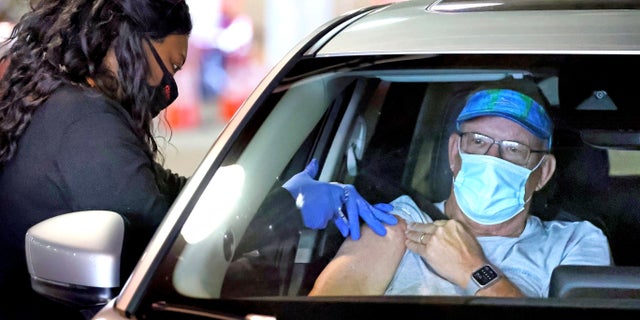
A Florida resident gets vaccinated at the drive-thru site at the Orange County Convention Center in Orlando, Monday, Feb. 22, 2021. (Joe Burbank/Orlando Sentinel via AP)
“I don’t think that that really is what’s driving it,” the governor said of businesses staying open. “People going to a business is not what’s driving it. I think when you see the younger folks, I think a lot of it is more just social interactions, so that’s natural. Obviously, you had a lot of different activities going on in different parts of the state. … So that’s just the reality.”
DeSantis added that doomsday predictions about Florida’s coronavirus numbers were off-base, and urged young residents to “protect the vulnerable” by socially distancing and steering clear of the elderly — stopping short of other governors, who have suggested residents should generally stay home.
EX-CLINTON ADVISER NAOMI WOLF WARNS US BECOMING ‘TOTALITARIAN STATE BEFORE OUR EYES’
“We’re open, we know who we need to protect, most of the folks in those younger demographics, although we want them to be mindful of what’s going on, are just simply much much less at risk than the folks who are in those older age groups,” DeSantis added.
A comparison of Florida and California similar COVID-19 trends with some of the highest case numbers in the country, despite one state being mostly closed and the other completely open. Florida’s population is slightly more than half of California’s, but the two states have reported similar case and death rates for their respective populations.
DeSantis’ popularity among the Republican Party has risen as a result of his decision not to shut down Flordia, and the state has seen an influx of new residents and even tourists amid the pandemic.
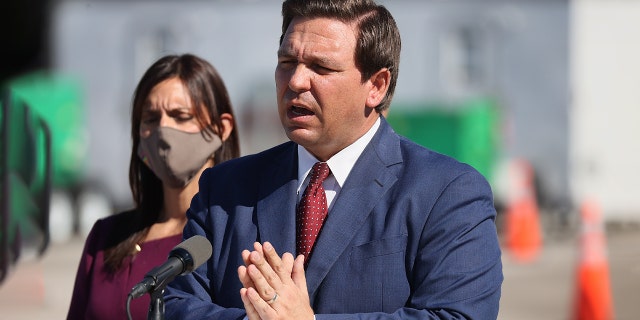
Ron Desantis (Getty Images)
“Our kids are in school. Parents are happy with that. Our economy is growing. People are working. And they were predicting economic doom, particularly for Florida, because we’re a tourism base and our tourism isn’t bad by any stretch,” DeSantis told “Fox & Friends” on Friday, adding that the Sunshine State is “getting huge revenue with no tax increases.”
Other states are beginning to further ease mask mandates and restrictions on businesses, events and so on.
Fifteen states, including Florida, Iowa and Missouri, have either lifted or never implemented statewide mask mandates, leaving it up to counties to implement the rules, with Montana being the latest state to do so.
Montana also lifted most restrictions on businesses, such as limitations on indoor gatherings, in January under the leadership of its new Republican governor, Greg Gianforte.
Other states that never implemented or have lifted mask mandates include Alaska, Georgia, Idaho, Montana, Nebraska, North Dakota, Oklahoma, South Carolina, South Dakota and Tennessee. Arizona only requires masks in certain settings.
CLICK HERE FOR THE FOX NEWS APP
Thirty-five states have eased at least some restrictions — such as restrictions on in-person learning and indoor dining — since last year.
States who have rolled back some restrictions since 2020 include Alaska, Arkansas, California, Connecticut, Delaware, Hawaii, Idaho, Illinois, Kansas, Kentucky, North Carolina, Nebraska, Nevada, New Jersey, New Mexico, New York, North Dakota, Maine, Maryland, Massachusetts, Michigan, Minnesota, Mississippi, Montana, Ohio, Oklahoma, Oregon, Pennsylvania, Rhode Island, Tennessee, Utah, Vermont, Virginia, Washington, Wyoming.
The Associated Press and Fox News’ Brie Stimson and Gregg Re contributed to this report.